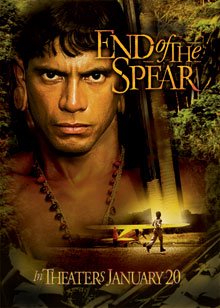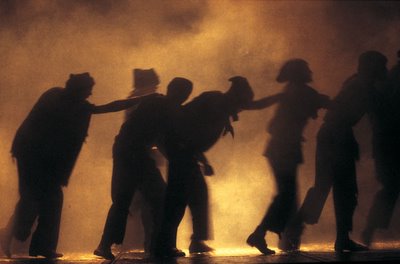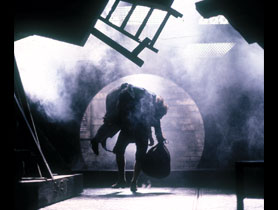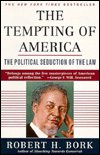(This is a review I wrote last year.)
Guess Who Entered the Human Rights Campaign? A Review of Freeing God’s Children: The Unlikely Alliance for Global Human Rights, by Allen D. Hertzke. New York: Rowman & Littlefield.
TRUE OR FALSE?
October, 2000. In support of the Trafficking Victims Protection Act, Bill Bennett gives a speech in a Senate caucus room and the next speaker reads a supportive statement from Gloria Steinem. One observer notes, “Bill Bennett and Gloria Steinem and Chuck Colson and Gloria Feldt are all saying the same thing.”
Good Friday, 2001. Michael Horowitz, Republican think tank director, and Joe Madison, African American radio personality, chain themselves to a fence at the Sudanese embassy in Washington (to protest that regime’s support of a growing slave trade) and are arrested, then call on Johnnie Cochran to defend Horowitz, and Ken Starr to defend Madison. Fearing publicity, prosecutors drop the charges.
Late in 2000. Pope John Paul II, U2’s Bono, and Pat Robertson join the campaign to provide debt relief to impoverished third-world countries. “Tightfisted Republican Senator” Phil Gramm threatens to filibuster the legislation. Pat Robertson asks viewers of the 700 Club to contact Gramm and demand he remove his hold on the legislation. Gramm promptly does just that.
Also in 2001. Kweisi Mfume and Al Sharpton join Jesse Helms, Henry Hyde, Dick Armey, and various evangelical leaders in calling for tough U.S. action against the NIF of northern Sudan.
Spring of 2003. Sudan violates its cease-fire agreement, causing the Midland Ministerial Alliance to deliver a letter to the Sudanese embassy under the letterhead “Hometown of President and First Lady Laura Bush.” The letter explains that the group has been documenting NIF atrocities for five years and “flouting of the law will have devastating consequences for the regime.” The letter gets the attention of the government of Sudan.
May, 2002. New York Times columnist Nicholas Kristof calls evangelicals the nation’s “newest internationalists,” saving lives “in some of the most forgotten parts of the world.” Some go so far as to label evangelicals the “foreign-policy conscience of conservatism,” rescuing Republican foreign policy from a takeover by big business.
* * *
All of the above statements are true. Surprised? If these unlikely alliances are news to you, you are not alone. This remarkable human rights movement has been all but ignored by the media. But the astonishing lack of coverage by the press has at least served to avoid giving away the ending of Allen Herztke’s Freeing God’s Children: the Unlikely Alliance for Global Human Rights. This movement has martialed the efforts of thousands of people all over the United States: feminists, Jews, Episcopals, Catholics, African American activists, modern-day abolitionists, and organizations as diverse as NOW, Amnesty International, the Campaign for Tibet, and the Southern Baptist Convention. Hertzke’s book tells the story of these unlikely alliances. As he notes, Washington is known for strange bedfellows (a phrase Hertzke avoids for much of the book) but Washington has rarely seen such pervasive alliances of generally adverse parties.

Freeing God’s Children is Hertzke’s response to a challenge put to him seven years ago by Michael Horowitz, senior director at the Hudson Institute and (as Hertzke describes him) a catalyst for this new human rights movement. Horowitz, formerly of the Reagan White House, challenged Hertzke, professor of political science and director of Religious Studies at the University of Oklahoma, to chronicle the nascent movement by diverse Americans to press human rights around the world. That movement has revolutionized U.S. foreign policy and brought extraordinary changes to the conditions of suffering peoples the world over.
Hertzke became a “participant observer” in January, 1998. He admits the obvious bias such involvement might create, but would have it no other way. Where outsiders (myself included) have reported on this movement by describing one of its parts, like the blind prophets who touch only part of the elephant, Hertzke comprehends the whole animal, and his striking book paints the most only complete picture available. Hertzke’s insider status also lends his writing greater immediacy. Indeed, his reports of various backroom meetings read like official minutes—or at least the pithy notes of one in attendance. A turn to the end notes confirms he was there. This first-person narrative elevates an already good story to the status of a thinking man’s page-turner.
The professor’s book, marketed for a general audience, is scholarly nonetheless. Hertzke interviewed some 50 individuals, many on multiple occasions, and he fills the book (and almost a thousand end notes) with a range of facts and sources that is staggering. The eight chapters average over 120 notes each. (A word to the publisher: chapter four’s notes are mis-numbered between nn.56 and 85.) The book also includes an index and various tables, graphs, and photos. I imagine Hertzke would have us read his book as a work of political science, one providing both context for and analysis of a remarkable movement. But this book reads first and foremost as the story of a movement. And that is as it should be. It is the story that will commend this book to readers of the world, not the cogent analysis. The narrative is remarkable, telling the story of an unusual coalition of liberals and conservatives, passionate people who managed to put aside deeply felt animosities to fight for the freedoms and the lives of thousands. In a few short years, that fight has seen unprecedented success, and Hertzke’s meticulous research documents that story in fascinating detail.
The story begins in the late 1980s as the fall of Soviet Communism combined with other factors to increase religious persecution around the world. It ends (for Hertzke’s purposes) in 2004 with the better-late-than-never enforcement of the Trafficking Victims Act (enacted in 2000), leading to the freeing of thousands of international sex slaves. As he tells the story, Hertzke examines the movement in the context of political theory. And such analysis is warranted and insightful. But I could not shake the feeling that what really excited the writer was the movement itself, not the implications such a movement has for the movement theory crowd. When Hertzke writes—albeit briefly—to his peers in political science circles, it is distracting. It’s not that the analysis is uninteresting or without merit. It’s simply so much less interesting than the epic saga documented in the larger work.
Hertzke’s thesis is that the movement is making a difference by waging war over human rights abuses that would otherwise have been ignored. As he puts it, the movement “is filling a void in human rights advocacy, raising issues previously slighted—or insufficiently pressed—by secular groups, the prestige press, and the foreign policy establishment.” Hertzke supports this argument with compelling evidence, illustrating that each of the movement’s campaigns have included three hallmarks: (1) a massive and slighted humanitarian tragedy, (2) engagement by the faith-based movement in alliance with others, and (3) pressure on the U.S. government to exercise more international leadership to stem abuses. These efforts have resulted in tough congressional legislation, robust executive action, and new international cooperation.
The book opens by explaining that recent years have seen a global resurgence of religion. This growth has touched all faiths, though Christianity may have grown the most. In fact, while Christianity is on the decline in Western Europe, it has grown so much around the world that it can no longer be described as a “white man’s religion.” “The majority of the world’s Christians, indeed, are females of color.” In fact, Christianity is no longer even a western religion. (Hertzke cites sources estimating that 70 percent of evangelicals now live in Asia, Africa, and Latin America.) But this return to religion, particularly a religion that teaches the equality of all in the eyes of God, presents a threat to the despots of the world. Believing that Christian churches helped topple Soviet Communism, China announced in 1992 through its state-run press: “If China does not want such a scene to be repeated in its land, it must strangle this baby while it is still in the manger.” Dozens of other nations soon joined China in bloody attempts to eradicate unwanted religions, and by 2000 it was estimated that “36 percent of the world’s population live in places where religious freedom is fundamentally violated.”
Enter Michael Horowitz, Nina Shea, Rabbi David Saperstein, the New York Times’ Abe Rosenthal, and “a cohort of fervent members of Congress,” including Chris Smith (R-NJ), Frank Wolf (R-VA), Tony Hall (D-OH), in the House and Joseph Lieberman (D-CT), Don Nickles (R-OK), and Sam Brownback (R-KS) in the Senate. These and a coalition of dozens of Jewish and Christian organizations and hundreds of committed men and women drafted and supported competing bills. But the coalition faced powerful opposition. Democrats and many in the human rights establishment were afraid to support a bill backed by such prominent evangelical leaders as Charles Colson and James Dobson. And Republican support was spotty because so-called “free-trade Republicans” could not stomach the threatened removal of non-humanitarian aid from nations deemed the worst persecutors. Worse yet, the Clinton White House promised to veto either bill. Then it happened: with the end of the 1998 Congressional season approaching and both bills doomed to failure, coalition members compromised, quickly amending, then solidly supporting one bill. Two months later, the International Religious Freedom Act passed both houses unanimously and was signed into law by President Clinton.
The International Religious Freedom Act radically altered the landscape for U.S foreign policy. It requires the President to address violations of religious freedom before engaging violating nations in more diplomatic activities, and it requires the State Department to annually collect and publish a mountain of data on the status of religious freedom in every foreign country. Presidents from both parties have proven reluctant to do either, and in the hands of an unwilling administration, both efforts might be compromised. But the law’s master stroke was the creation of an independent and bi-partisan commission. The commission makes its own report and makes policy recommendations to the president. Unfettered by concerns about diplomacy and politics, the U.S. Commission on International Religious Freedom has done remarkable work since its inception in 1998. The story of the Commission and of the law that created it is amazing indeed, and Hertzke devotes half his book to that process.
But there’s more. When the International Religious Freedom Act was passed, a huge coalition of willing workers was left in its wake. Many of these were motivated by a sense of religious calling, and though new to human rights advocacy were ready to do more. So Horowitz and others took the reins of the movement and pointed it at Sudan, where troops have been capturing and selling human slaves for years, a profitable alternative to their primary business of genocide. I recently mentioned the Sudanese slave market to my otherwise well-informed lawyer-colleagues. Not only had they heard nothing about the scourge of modern slavery, they were so skeptical about its existence, they insisted on seeing Hertzke’s book for themselves. Fortunately, Freeing God’s Children includes dozens of photos, and one shows Christian Solidarity International’s John Eibner purchasing slaves in Sudan so his organization might set them free.
Hertzke offers interesting explanations for the lack of press coverage generated by these struggles. Many in the press have not adjusted to new realities following the fall of Soviet Communism, and when politically liberal Jews, conservative evangelicals, and Catholics joined together to fight international human rights abuses, the press was unwilling to report on alliances it could not see through cold-war lenses. Others in the press may not yet understand the role religion plays in international conflicts, and many disregard all religious motives as either part of the problem or as simply irrelevant. A more cynical theory says of the press corps that when human rights are violated, it’s not news unless the oppressor is white. For some in the media, oppression by non-whites is less evil somehow, more tolerable because it is being done not by some colonizing empire, but by the locals, noble savages that they are. Whether Hertzke shares this view of the press is not clear, but the evidence supporting such a conclusion is persuasive.
The new religiously-motivated human rights coalition sees oppression differently. Not only did the coalition succeed in getting the Sudan Peace Act passed, but it kept pressure on the Sudanese government, forcing it to maintain its cease fire—thus ending a 20-year civil war and the slaughter of millions of Southern Sudanese. In addition to its efforts in Sudan, what began as a battle to end international religious persecution has since turned the world’s attention to North Korean atrocities, to international sex slavery, resulting in the passage of the Trafficking Victims Protection Act, to international debt relief, relieving the burden on impoverished third-world countries, and to the domestic plague of prison rape, resulting in the Prison Rape Elimination Act. At each stop along the way, new members flocked to the coalition and its rapid growth continued.
This work is comprehensive. As a scholar, Hertzke is content to take his time, to examine and catalog each fact. But somewhere along the way, the tiles recede and an extraordinary mosaic appears. The big picture here is astounding, as so many diverse groups put their differences aside to fight for suffering people they will never meet. And the largest of these groups is composed of American evangelicals, a body few associate with global human rights. This is a case of truth being stranger, or more miraculous, than fiction. Given the opposition this movement has repeatedly faced, its many successes have often been seen as nothing short of providential. Hertzke shares such a view, and it lends his writing an affectionate tone, making even the minutiae compelling. In this story, it is not the devil, but God who is in the details.
This book is one-of-a-kind, the sine qua non on the subject. Without it, the uninitiated cannot fully comprehend current human rights struggles. Freeing God’s Children is a systematic chronicle of a profound and effective movement. This book is as deep as Washington politics gets, and as broad as any spy thriller, taking the reader to Burma, Israel, Australia, Saudi Arabia, Russia, Iran, Pakistan, Tiananmen Square, and dozens of other far-flung locales, along with one extraordinary stop in Midland, Texas. Hertzke’s book is an attempt to sing an epic song. Hertzke sings it well. But unlike epics of old, this is the tale of not one but dozens of previously unsung heroes, people of every political and religious persuasion, who have shown amazing tenacity in the face of seemingly insurmountable odds. Where most would shrug and say, “Oh, well, I tried,” the men and women in these pages seem incapable of giving up.
No book on human rights would be complete without tales of suffering victims, and this one includes dozens. But the part of me that stares at car accidents wanted to read more, though such is not Hertzke’s purpose. (Helpfully, he names other books filled with such accounts—stories that must be told if Americans are to continue to fight for victims a world away). But the book ends with a tale of one life redeemed. Laneh, a child of six, was rescued from sexual slavery in a Cambodian brothel. Her life has been changed forever. This story is part of a larger essay on the future of the movement, and is some of the best writing in the book. Hertzke enjoys the material and the book ends with a tone and a tale that—after the 300 pages that precede it—is hopeful, cathartic, moving. The dispassionate scholar has finally unpacked his bags, carefully set out the contents, and put down his outline. Hertzke ends where most of his subjects have been for a decade, working and writing from the heart.
* * *
If you have read this far, congratulations (and thanks!). The book is available here--where I officially donated this review to Amazon.com. You know how badly they need a little pro bono reviewing....
 Once upon a time, the person in a community likely to be the best educated, the best informed, and certainly the best orator (to use the nomenclature) was the local priest or parson. He was the man you looked to not only for Biblical wisdom but for insight about the day's events. Not only were many of our nation's founders either in the ministry or educated for the ministry, but local pastors led the members of many Colonial churches to take up arms against the King. Many of them joined the battle--including the two "fighting parsons" pictured here.
Once upon a time, the person in a community likely to be the best educated, the best informed, and certainly the best orator (to use the nomenclature) was the local priest or parson. He was the man you looked to not only for Biblical wisdom but for insight about the day's events. Not only were many of our nation's founders either in the ministry or educated for the ministry, but local pastors led the members of many Colonial churches to take up arms against the King. Many of them joined the battle--including the two "fighting parsons" pictured here.
 We need to love our pastor(s). Pray for him. And be thankful for him, whatever his weaknesses. The gospel ministry is no more about impressing people with deep insights or flowery oratory than marriage is about non-stop passion, or a career fulfilling and perfect every single day. Pastors are given to the church to teach us and equip us for ministry. Not to impress us with their education, brilliant rhetoric, or insightful commentary on the events of the day. Often such concerns have more to do with entertainment than sanctification. Consider them blessings when they come, but do not expect the preacher to be more entertaining--or even more insightful--than everything else out there. No one is that good all the time. Not in an information age.
We need to love our pastor(s). Pray for him. And be thankful for him, whatever his weaknesses. The gospel ministry is no more about impressing people with deep insights or flowery oratory than marriage is about non-stop passion, or a career fulfilling and perfect every single day. Pastors are given to the church to teach us and equip us for ministry. Not to impress us with their education, brilliant rhetoric, or insightful commentary on the events of the day. Often such concerns have more to do with entertainment than sanctification. Consider them blessings when they come, but do not expect the preacher to be more entertaining--or even more insightful--than everything else out there. No one is that good all the time. Not in an information age. And enjoy the wealth of information at your fingertips--but don't get so saturated in the ubiquitous media that you lose touch with relationships. What matters in life is the people, the ones you know well, and the ones you fellowship with across the aisle. Church is about building your life, your character, and your relationships, both with people, and with Christ. Go there, expect Him to hear your worship and to touch your life (whether you realize it or not) and be blessed. We would all be wise to give our pastors a break. Stop expecting them to dazzle us with profundities. Sometimes the simplest and shortest message is the one you most need to hear.
And enjoy the wealth of information at your fingertips--but don't get so saturated in the ubiquitous media that you lose touch with relationships. What matters in life is the people, the ones you know well, and the ones you fellowship with across the aisle. Church is about building your life, your character, and your relationships, both with people, and with Christ. Go there, expect Him to hear your worship and to touch your life (whether you realize it or not) and be blessed. We would all be wise to give our pastors a break. Stop expecting them to dazzle us with profundities. Sometimes the simplest and shortest message is the one you most need to hear.
















